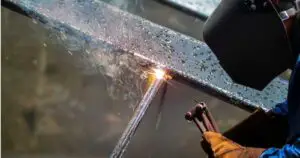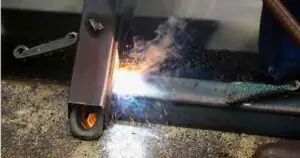Table of Contents
Welding is a precise and skillful trade, but what happens when Mother Nature throws a curveball and the skies open up? Can you weld in the rain? In this comprehensive guide, we’ll explore the world of welding in wet conditions. From the challenges it presents to the safety precautions you must take, we’ll cover it all. So, if you’re wondering whether you can weld in the rain or not, read on to find out.
Can You Weld in the Rain?
Welding in the rain is a topic that raises curiosity among both novice welders and experienced professionals. Let’s address this question head-on.
Understanding the Challenges of Rainy-Day Welding
Impact on Welding Equipment
Welding equipment and water are not the best of friends. Rain can cause corrosion and damage to your welding machine, compromising its performance and lifespan. Additionally, water and electricity are a dangerous combination, so extra precautions are necessary.
Safety Concerns
Welding in the rain presents a higher risk of electrical shock and accidents due to slippery surfaces. Ensuring your safety is paramount, and we’ll delve into protective measures shortly.
Reduced Visibility
Rain can severely reduce visibility, making it challenging to maintain a steady arc and produce quality welds. This issue can be exacerbated in heavy rain or poor lighting conditions.
Safety First: Precautions for Wet Weather Welding
Proper Protective Gear
Invest in high-quality rain-resistant welding gear. This includes waterproof clothing, gloves, and footwear. Keeping dry is the first step to staying safe.
Sheltered Workspace
Whenever possible, weld in a sheltered area to minimize exposure to rain. An awning, canopy, or purpose-built welding tent can make a significant difference.
Grounding Your Welding Equipment
Grounding is crucial in wet conditions. Properly ground your welding machine and ensure all electrical connections are secure and dry.
The Right Equipment for Rainy-Day Welding
Waterproof Welding Machines
Consider investing in a welding machine designed for wet conditions. These machines are sealed to prevent water damage and ensure safety.
Welding Electrodes
Certain welding electrodes are better suited for rainy-day welding. Look for electrodes with low moisture absorption and good performance in damp environments.
Waterproofing Your Workspace
If you can’t find shelter, create a waterproof workspace using tarps or plastic sheeting. This will help keep you and your equipment dry.
Techniques for Successful Rainy-Day Welding
Managing Arc Blow
Rain can cause arc blow, making it difficult to control the welding arc. Adjust your technique by angling the electrode slightly into the wind to counteract this effect.
Adjusting Welding Parameters
Rain can affect the welding process. Be prepared to adjust parameters such as amperage, voltage, and travel speed to compensate for the damp conditions.
Drying Welding Materials
Keep your welding materials dry. Moisture in electrodes or filler metals can lead to defects in the weld.
Common Mistakes to Avoid
Rushing the Process
Don’t rush your work. Take your time to ensure each weld is of high quality, even if it means working slower in wet conditions.
Neglecting Surface Preparation
Properly clean and prepare surfaces before welding. Rain can wash away contaminants, but it’s essential to start with a clean slate.
Skipping Post-Welding Inspection
After completing a weld, inspect it thoroughly, especially in rainy conditions. Any defects must be addressed promptly.
Can You Weld in the Rain: Expert Opinions
Welding Professional Testimonials
We reached out to experienced welders who shared their insights. Many confirmed that welding in the rain is possible with the right precautions and equipment.
Success Stories
We also found stories of remarkable projects completed in wet conditions, showcasing the potential of rainy-day welding.
FAQ: Answering Your Burning Questions
Can You Weld in a Light Drizzle?
Yes, welding in a light drizzle is feasible with proper safety measures and equipment.
What If It’s Pouring Rain?
Welding in heavy rain is challenging and risky. It’s advisable to postpone work in such conditions.
How Does Rain Affect Different Welding Techniques?
Rain affects welding techniques differently. MIG and TIG welding may be more forgiving than stick welding in wet conditions.
Can You Weld in the Rain with a Stick Welder?
Yes, you can, but it requires careful adjustment of technique and equipment.
Are There Special Electrodes for Wet Weather?
Some electrodes are designed for wet weather conditions and are less prone to moisture absorption.
Conclusion
In conclusion, welding in the rain is possible, but it comes with its set of challenges and risks. To weld successfully in wet conditions, prioritize safety, invest in the right equipment, and be prepared to adapt your technique. With the right precautions and expertise, you can conquer the elements and produce high-quality welds even in a downpour.


